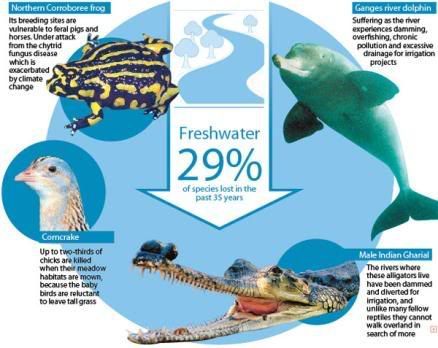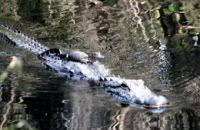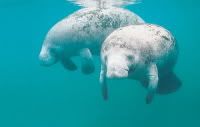
An epidemic of extinctions: Decimation of life on earth
Species are dying out at a rate not seen since the demise of the dinosaurs, according to a report published today – and human behaviour is to blame.
By Emily Dugan
The Independent UK
Friday, May 16, 2008
The world's species are declining at a rate "unprecedented since the extinction of the dinosaurs", a census of the animal kingdom has revealed. The Living Planet Index out today shows the devastating impact of humanity as biodiversity has plummeted by almost a third in the 35 years to 2005.
The report, produced by WWF, the Zoological Society of London (ZSL) and the Global Footprint Network, says land species have declined by 25 per cent, marine life by 28 per cent, and freshwater species by 29 per cent.
Jonathan Loh, editor of the report, said that such a sharp fall was "completely unprecedented in terms of human history". "You'd have to go back to the extinction of the dinosaurs to see a decline as rapid as this," he added. "In terms of human lifespan we may be seeing things change relatively slowly, but in terms of the world's history this is very rapid."
And "rapid" is putting it mildly. Scientists say the current extinction rate is now up to 10,000 times faster than what has historically been recorded as normal.

By numbers: the earth's wildlife in decline
As nations meet for the Convention on Biological Diversity in Bonn, these alarming figures will cast a shadow over government pledges to make a "significant" reduction in biodiversity loss by 2010. In fact, the report's authors say that global inaction has already made such a goal totally unattainable.
"It's very damning for the governments that are party to the convention that they are not able to meet the target they set for themselves," said Mr Loh. "The talk doesn't get translated into action. We are failing, and the consequences will be devastating."
Tracking nearly 4,000 species between 1970 and 2005, the team has not only revealed the destruction of the Earth's wildlife, but also pointed the finger at the perpetrators of this devastation.
Ben Collen, extinctions researcher at ZSL, said: "Between 1960 and 2000, the human population of the world has doubled. Yet during the same period, the animal populations have declined by 30 per cent. It's beyond doubt that this decline has been caused by humans."
The study picked out five reasons for species decline, all of which can be traced back to human behaviour: climate change, pollution, the destruction of animals' natural habitat, the spread of invasive species, and the overexploitation of species. At a time when America has finally added the polar bear to the endangered species list, it is emerging that the scale of species destruction reaches far beyond the headline animals. But as in the case of the polar bear, mankind's behaviour needs to be radically changed in order to stop this pillaging of the Earth's biodiversity.
The Yangtze river dolphin is a case in point. Scientists believe it is extinct, as successive searches for the freshwater mammal have proved fruitless. There are many reasons for its rapid path to extinction: collisions with boats, habitat loss and pollution. These factors all point back to one perpetrator: mankind.
Aside from tackling global emissions, the report recommended two ways that species decline could be combated – by avoiding the destruction of animals' natural habitat by overdevelopment or cultivation; and in avoiding the over-farming or fishing of individual species.
The implications of such drastic reductions in biodiversity are already having an impact on human life. "Reduced biodiversity means millions of people face a future where food supplies are more vulnerable to pests and disease and where water is in irregular or short supply," said James Leape, director general of WWF.
"No one can escape the impact of biodiversity loss because reduced global diversity translates quite clearly into fewer new medicines, greater vulnerability to natural disasters and greater effects from global warming. The industrialised world needs to be supporting the global effort to achieve these targets, not just in their own territories where a lot of biodiversity has already been lost, but also globally."
MORE INFO


Support the Florida Endangered Species Network, of which Wildwood Preservation Society is a proud member organization.

Wildwood Preservation Society is a non-profit 501(c)(4) project of the Advocacy Consortium for the Common Good. Click here to learn more.
"it's all connected"













No comments:
Post a Comment